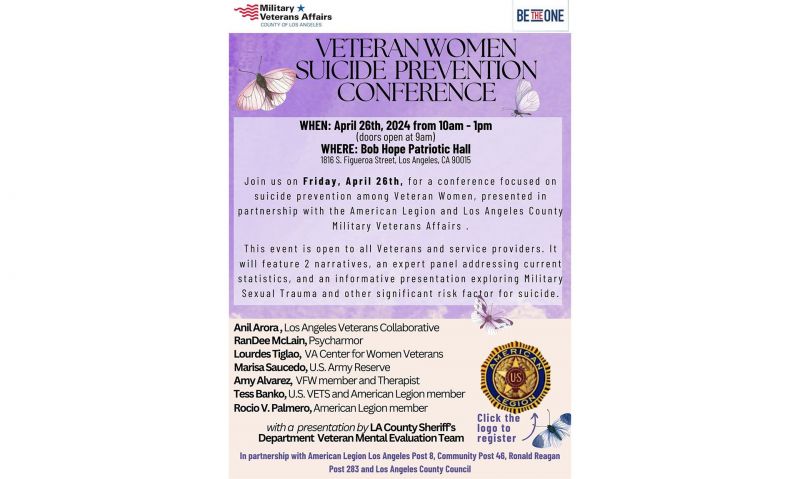
California Legionnaire Rocio Palmero, with the backing of three Legion posts, has coordinated a suicide prevention conference for April 26.
Rocio Palmero served in the U.S. Navy from 1992 to 1994 and then in the Navy Reserve for the next 12 years. But when she left the reserves in 2006, she felt lost. Those feelings amplified when she went to college and didn’t meet a single other veteran in two and a half years.
But after getting a job with the nonprofit U.S. VETS, Palmero came into contact with The American Legion and eventual future Department of California Commander Jere Romano. Learning more about the organization and at the urging of several of its members, Palmero joined Community Post 46 in Culver City, Calif.
She’s taken on leadership roles at the post, area and district levels, and now she’s expanding to bring information to her community about The American Legion’s top priority: veteran suicide prevention.
On April 26 at Bob Hope Patriotic Hall in Los Angeles, three California American Legion posts – Post 46, Post 8 in Los Angeles and Ronald Reagan Post 283 in Palisades – are teaming with the Los Angeles County Department of Military and Veterans Affairs (MVA) for a Veteran Women Suicide Prevention Conference.
The event, organized by Palmero, is open to all veterans and service providers and will feature first-person narratives from two veterans who have been at risk for suicide, an expert panel addressing current suicide statistics, and a presentation on military sexual trauma and other significant risk factors for suicide.
Palmero said in the past six months, four women veterans have died by suicide in the Los Angeles and Orange County areas. “We all know that these issues are going on, but nobody’s doing anything about it,” she said. “We need to address this stuff now. We need to have these conversations now. It’s not a training. These are conversations where facts and figures are coming out and conversations are being had in these fields.”
Speakers include representatives from The American Legion, the VA Center for Women Veterans, the U.S. Army Reserve, U.S. VETS and Psycharmor, a nonprofit and training provider for military cultural awareness for members of the military-connected community and anyone who wants to more effectively engage with them.
The event also will feature a presentation from the LA County Sheriff’s Department Veteran Mental Evaluation Team.
“We have a powerhouse of panelists,” Palmero said. “They are people who can talk about and give others the ideas on how we can support our veterans. What are things we can be looking for? What is something that somebody is experiencing that I might not realize they’re experiencing?”
Palmero, who now serves as Post 46’s vice commander, as well as Area 6’s and District 24’s chaplain, said she found a calling in the Legion years after leaving the military.
“I struggled for many years because I wouldn’t identify as a veteran, and I didn’t realize I was having mental health issues,” Palmero said. “And people would see me, but they wouldn’t say anything. And the majority of the reason was because I wasn’t around other veterans. I’d stopped drilling in the reserves … and then I went to an all-women (college), and there were no other veterans. I was there for two and a half years and never met any other veterans. And I tried. I was very lonely, and I didn’t realize that’s what I was feeling.”
After going to work for U.S. VETS, she became familiar with The American Legion, where she met Romano, California’s department commander from 2022 to 2023. Talking with Romano and his wife, she discussed trying to find post. Four months later she joined Post 46.
“It was people just reaching out to me, being open to me asking questions or telling me about the history and why it’s important,” Palmero said. “And one of the things that stuck out to me was that in 1919, when The American Legion was established … I had access to join The American Legion as a veteran from World War I before I had the right to vote in this country. And that did not fall on deaf ears.
“It became part of my healing. All of the sudden I didn’t feel like I was ‘crazy.’ I didn’t feel like I had to deny part of myself. When you stop working at Target, you’re no longer a Target member. When you stop being a plumber, you’re no longer a plumber. But once you stop serving in the military, you don’t stop being a veteran. You’ll be a veteran the rest of your life. And I was able to surround myself (with other veterans).”
Palmero said what she and others are trying to do in the Los Angeles area falls in line with The American Legion’s Be the One suicide prevention program.
“Having these conversations gives us the opportunity to listen with awareness. To comfort with awareness,” she said. “I really believe having these discussions empowers people, instead of walking away from someone because we don’t know what to do. This gives them the information to say, ‘Hey, this is someone you can help just by listening. Just by talking.’
“And there are some American Legion posts where people don’t know how to have this conversation. So, they’d rather stay quiet sitting next to someone in need. So, I think this is going encourage all of us to Be the One.”
- Be the One

